Plates from Prince Maximilian's Travels to Brazil, 1820
Several years before Prinz Maximilan zu Wied-Neuwied made his famous scientific expedition to North America, he conducted a similiar expedition to South America, specifically, to the tropical forests of Brazil.
The expedition was documented in the Prince's first book,
Maximilian zu Wied, Reise nach Brasilien in den Jahren 1815 bis 1817, Frankfurt, 1820-21; in English, Henry Colburn & Co., London, 1820.
The book contains six plates showing magnificent Brazilian scenes, two of which include the Prince himself.
|
Caption: Puris in their Hut. (Facing the title page.)
"When our first curiousity was satisfied," writes the Prince (p. 118), "we requested the savages to conduct us to their huts... They are certainly some of the most simple in the world...small and so exposed on every side, that when the weather is unfavourable the brown inmates are seen seeking protection against it by crowding close round the fire...: at other times the man lies stretched at his ease in his hammock, while the woman attends the fire, and broils meat, which is stuck on a pointed stick."
|
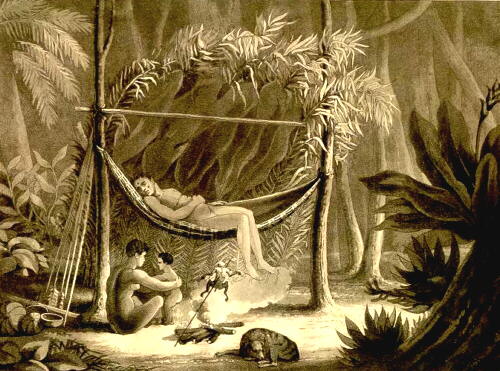
|
|
Caption: Excursion up a branch of the Rio Doce. [Prince Maximilian is one of the dark-clad figures.] (Page 171)
"We were impatient to sail up the beautiful Rio Doce, in order to make ourselves acquainted, if possible, with the interesting theatre of the war in the forests with the Botocudos; but owing to the roughness of the river, occasioned by a violent wind on the 25th of December, we were advised by our soldiers to defer our departure till the next day. The following morning was warm and calm, and we accordingly embarked at daybreak in a long canoe..." (Page 175)
|
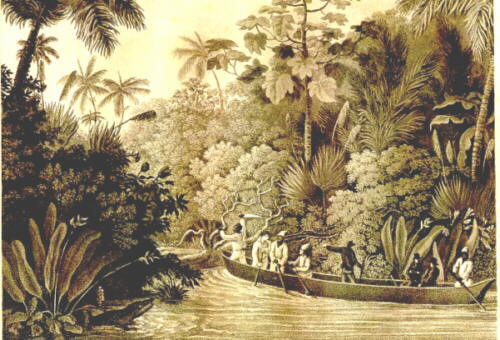
|
|
Caption: Opening of the New Road along the Mucuri. Prince Maximilian is wearing a tophat. (Page 202)
"As the rivers afford the means of the most speedy communication, it has been resolved to make these roads along them. One has been opened on the Mucuri... The forests near the Mucuri are chiefly inhabited by Patachos. Botocudos rove but occasionally through them to the coast." (Page 202)
|

|
|
Caption: Patachos of the Rio do Prado. (Page 247)
Prince Maximilian writes on page 247: "They were of the tribe of the Patachos, none of whom I had ever yet seen, and had come down from the woods to the plantations but a few days before. They entered the town stark naked, with the arms in their hands, and were immediately surrounded by a crowd of people. They brought large balls of black wax for sale, and we procured a number of bows and arrows of them, in exchange for knives and red handkerchiefs."
|
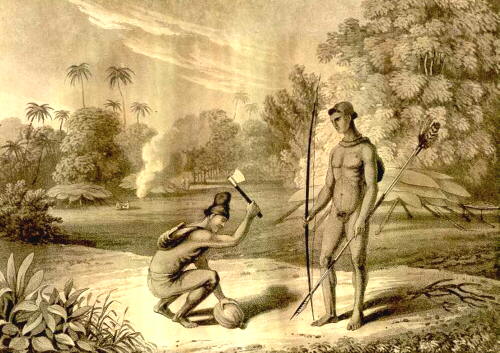 |
|
Caption: A Family of Botocudos on a Journey. (Page 291)
"The sight of the Botocudos astonished us beyond all expression; we had never before seen such strange and singularly ugly beings. Their original countenances were farther disfigured by large pieces of wood which they wore in their lower lips and in their ears: the lip is thus made to project very much, and the ears of some of them hang like large wings down to their shoulders..." (Page 204)
|
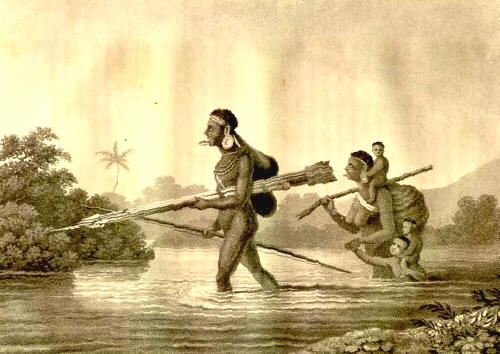
|
|
Caption: Single Combats of the Botocudos. (Page 323)
"The combat was just beginning. First, the warriors of both parties uttered short rough tones of defiance to each other, walked sullenly round one another like angry dogs, at the same time making ready their poles... suddenly, two of them advance, and pushed one another with the arm on the breast... One struck with all his might at the other, regardless where the blow fell: his antagonist bore the first attack seriously and calmy, without changing countenance;
|
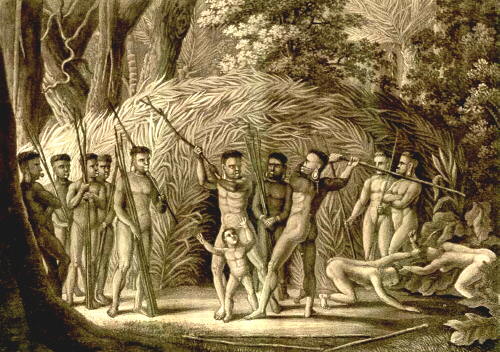
|
he then took his turn, and thus they belaboured each other with severe blows, the marks of which long remained visible in the large wheals on their naked bodies. As there were on the poles many sharp stumps of branches which had been cut off, the effect of the blows was not always confined to bruises, but the blood flowed from the heads of many of the combatants. When two of them had thus thrashed each other handsomely, two more came forward...
The lamentations and howlings of the women and children likewise resounded from the neighbouring huts, and heightened the effect of this most singular scene... In this manner the combat continued for about an hour; when all appeared weary, some of the savages showed their courage and perseverance, by walking among the others, uttering their tones of defiance... All of us then left the field of battle, which was covered with earplugs and broken poles..."
Maximilian zu Wied, naturalist and ethnologist
New Harmony Scientists, Educators, Writers & Artists
Clark Kimberling Home Page





